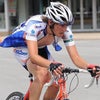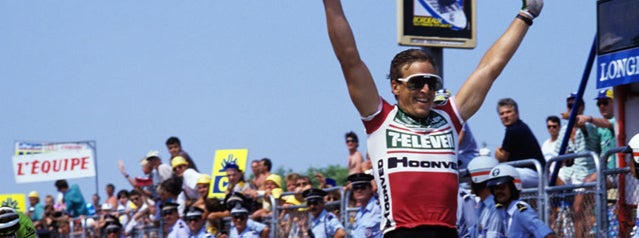Davis Phinney loved winning. And he was famous for it. Before Lance Armstrong won his first Tour de France and back when Greg Lemond was making his inroads into the top of the European peloton, Phinney was an American all-star. He was only the second American to win a stage at the Tour and took the bronze medal in the 1984 100k time trial at the Olympics.
But after years of feeling off, he was diagnosed with early-onset Parkinson’s disease. In the years since that diagnosis, a lot has changed—from what he can do with his hands to the way he thinks about life. Along the way, he founded the . But he’s not looking for a cure; instead, he’s working on a way to help people live well today. And a big part of that is the . As the foundation prepared to release the second edition of that resource, Scott Rosenfield spoke with the cycling legend.
What exactly is the Every Victory Counts manual?
The EVC manual is basically a tool for people—whether they’re newly diagnosed or not—that fleshes out more of what they can do to improve their own situation in very reasonable and understandable ways than what they might just get from their neurologist. It’s chock-a-block full of good information, and education, and wisdom from patients, and doctors, and caregivers.
And what are you hoping that people living with Parkinson’s disease can take away from the manual?
Everyone with Parkinson’s has similarities and differences. The common themes are that you are watching yourself becoming progressively disabled. And that’s disconcerting. A lot of my community feels isolated. They don’t want to go out and engage in the world as they used to know it.
I want people to be able to feel like this manual helps them find what they are particularly looking for—whether it’s becoming better prepared for your check-up with your doctor or what specific questions to ask, or motivating you to find a Parkinson’s group that’s actively engaged in promoting well-being—whether it’s a singing group, or yoga or dance or movement.
How have you applied the lessons from the EVC and your racing career to living with Parkinson’s?
When you’re an athlete, you need to be fairly self-aware and you need to be consistently taking care of yourself—eating right, sleeping well, and training for your sport. When you live with a disease like Parkinson’s, those same tools can still prove valuable in stemming your decline somewhat. If I start my day right and am eating correctly and getting out for a little bit of exercise—not too much but something is always better than nothing—and then get on with my day and make sure I’m monitoring my energy levels, and eating right, and taking care of myself as best I can, I find over the long term my health is better, which is true for anybody, but particularly true if you have a degenerative disease like Parkinson’s.
What about limits imposed by the disease?
There are things that take me an inordinate amount of time, like washing dishes, or this last month while I’ve been with Taylor following his training rides and being like a bottle boy, handing out water bottles to the group and washing about 60 bottles a night and refilling them in the morning, he’s like, Can I help you out, because we really have to get going.
It takes me a lot longer to accomplish the tasks, but there is a benefit in continuing to challenge yourself to do things. While I don’t do them nearly as quickly as I once did, I still can do them. I try not to become too reliant on others and let everyone do things for me, but hold on to chores that force my hands to function, and force me to focus so I’m not dropping things or whatnot.
Why does the foundation focus on improving quality of life?
When we first became a foundation my initial interest, like Michael J. Fox, was to raise money for research that would find a long-term cure for the disease. But as time went on and I met more and more of my community—my tribe, as I call those of use with Parkinson’s disease—it became clear to me that there is a whole segment of my community that was just waiting on hope that some researcher somewhere would come up with a cure-all fix for the disease.
So many of us were just waiting, and that kind of passivity leads to a certain amount of decline. And life was just going by and going by and going by. I really felt it was important that people engage in their own health more, and find ways to not just stem decline but find ways to enjoy life while living with this progressively degenerative disease. And those messages and that encouragement, backed up by solid information and programs, has been very, very well received.
And how has cycling informed your current mindset?
When I was a rider one of my primary skill sets was sprinting. I was a fast finisher at the end of a bike race. I’ve always been more of a moment-to-moment kind of guy. On that day of the race, racing was the most important thing I was doing. I became quite adept of freeing my mind from worries or concerns about the future. That moment-to-moment focus has really helped me now with this disease because if you’re looking long-term at a progressively degenerative disease, that can lead to a hopeless situation.
One thing that I really promote—and hence the word victory in a lot of things the foundation produces—is not focusing so much on the long-term but bringing things in close and enjoying aspects of today, and that way you’re able to enjoy your life more. And it’s out of necessity. It really allows me to live a positive life—just because I actively seek out positive situations and positive experiences.
And how do you live that philosophy?
Whether it’s just getting out on a really beautiful morning and walking on the trails by my house or having a good conversation or a good cup of coffee or a type of wine I like, it’s a matter of really appreciating those simple things. That sounds trite and clichĂ©, but it’s a proven survival tactic, and I advocate it unabashedly. When I am focused on those good moments and aware of them and acknowledge them, I put them in the victory column.
What does victory mean for you now?
In bike racing, if you win something you better put your arms up. In those few fleeting seconds that surround crossing the finish line and winning the race, you don’t have Parkinson’s; you’re in another, different place. So that’s my philosophy on finding my own cure—making those victories count. Just amplifying the amount of moments you’re not in the Parkinson’s body, but you’re purely enjoying your life. All of that comes from bike racing.
And have you always had this outlook since your diagnosis?
No, no, no. It took me a few years. Immediately after diagnosis I was in denial. It took us actually moving to Italy. As part of my understanding with the disease, I needed to slow down and stop being in perpetual motion and stop trying to push myself in the ways I had for years and years at work and in athletics.
It was in Italy where I really came to see the beauty of observation. I realized there, first and foremost, what a beautiful place surrounded me. Boulder is a beautiful place too. But when you’re so closed in with your own myopia and encased by this disease, you don’t open your eyes as much and see things clearly. But there was just this visual fiesta that surrounded us every day. And I had always liked photography and taken pictures. It was there that I started really noting and appreciating all of this beauty around me.
But how did you translate that feeling of victory in racing over to everyday life?
It sort of slowly came to me, like I said, maybe I should look at victories and that exultant moment of victory that I pursued as a bike racer—what I used to feel while crossing the line first, the payoff for all the work. And I thought, maybe that feeling and experience could translate into my daily life through this awareness of positive experiences. And so I started taking more pictures and started being more present with my kids. My daughter would run up and give me big hug, and I was like, Oh yeah, this is what it’s all about.
And I realized, really quickly, I’m looking around and seeing this beauty and denoting it with photos and appreciating all of these sensorial good things in the food, in the coffee, in the conversation, and whatnot that so much of my day here I’m not even thinking about Parkinson’s. It was just his complete revelation to me that I had a certain amount of say over my disease, and I became much less of a victim and much more of a proactive force in managing my own well-being, and I’ve honed it ever since, and I stick to it with regularity. That’s one reason why we have the manual—help people find their own path by shining some brighter lights onto the possibilities.


